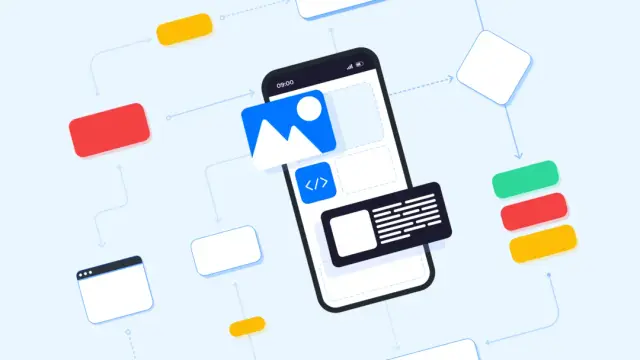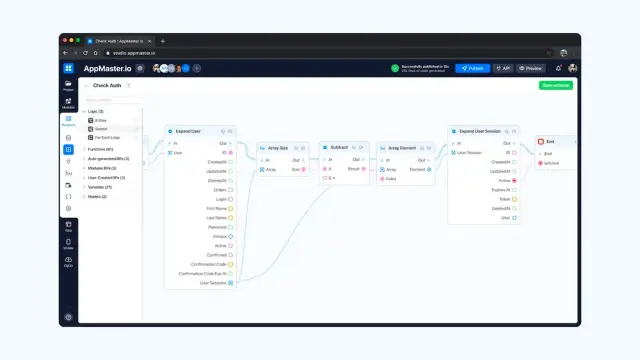The Top 10 Mistakes No-Code Agencies Make and How to Avoid Them
Discover the top 10 common mistakes no-code agencies make when building and launching applications. Uncover expert advice on how to avoid these pitfalls and achieve success in the no-code world.

No-code platforms have transformed how businesses approach application creation and digital solutions in software development. No-code development empowers individuals and organizations to build sophisticated applications without traditional coding expertise, promising speed, agility, and accessibility like never before. With this revolution, a new breed of service providers known as "No-Code Agencies" has emerged, offering their expertise to guide clients through the no-code journey.
But despite the promises of simplicity and efficiency, no-code development is not immune to its challenges. In their quest to deliver exceptional results, No-Code Agencies often encounter a range of pitfalls that can hinder project success and client satisfaction. In this blog article, we will explore and dissect the top 10 mistakes commonly made by No-Code Agencies and provide invaluable insights on how to circumvent these pitfalls.
1. Failing to Validate Client Ideas
One of the critical mistakes no-code agencies make is not validating client ideas before beginning the development process. Jumping straight into development without validating an idea can lead to wasted time and resources. To avoid this, take the time to assess the client's ideas and determine whether they align with their goals, target audience, and budget constraints. A thorough idea validation process includes:
- Understanding the client's business objectives and target market.
- Identifying any gaps in the market or unique selling propositions.
- Reviewing competitors and analyzing the differentiation factors.
Moreover, it is essential to determine if a no-code approach is suitable for the specific project requirements, so both the client and the agency can manage their expectations accordingly. Finally, communication is crucial in the validation stage. Engage in open and honest discussions with your clients to ensure everyone is on the same page, and priorities align.
2. Overestimating the Capabilities of No-Code Platforms
No-code platforms are powerful tools that enable rapid application development. But overestimating their capabilities may lead to projects that don't meet client expectations or have limitations that hinder users' experience. To avoid this, thoroughly evaluate the platform's capabilities and ensure it aligns well with the project goals and requirements. Here are a few steps to avoid overestimating the capabilities of no-code platforms:
- Conduct thorough research on your chosen no-code platform, understanding both its strengths and limitations.
- Make a thorough comparison between client requirements and platform capabilities, identifying any potential gaps early in the project.
- Avoid attempting to fit square pegs into round holes - if a no-code platform is not suitable for a specific requirement, it may be more efficient and cost-effective to consider an alternative solution.
Being realistic about the platform's capabilities and clearly communicating this with your clients will help manage expectations and enhance project success.
3. Insufficient Planning and Project Management
A lack of planning and poor project management can derail any software development project, and no-code development is no exception. Insufficient planning may lead to delays, budget overruns, and a chaotic development process, diminishing the advantages of no-code platforms such as speed and simplicity. To ensure appropriate planning and project management, consider these best practices:
- Create a clear project roadmap, with milestones and deadlines, ensuring all stakeholders understand their roles and responsibilities.
- Utilize project management tools to monitor progress and collaborate effectively. This keeps the team organized and accountable throughout development.
- Establish regular communication with clients, providing status updates and addressing concerns as they arise. Maintain transparency and trust as the foundation of the development process.
- Consider implementing agile methodologies into your project management processes. They cater to the rapid nature of no-code development, allowing teams to adapt as required.

A well-planned and organized approach to project management will keep your no-code development project on track, ensuring it is completed on time, within budget, and in line with client expectations.
4. Inadequate Testing and Quality Assurance (QA)
Quality assurance and testing are crucial to any application development process, including no-code projects. No-code platforms simplify the development process, but this doesn't absolve developers of their responsibility to test applications rigorously. Skipping or skimping on testing can lead to subpar app performance, malfunctioning features, and negative user experiences.
To avoid potential pitfalls related to inadequate QA, keep the following tips in mind:
- Integrate testing into every development phase: When building an application, work with your team to create a strategy emphasizing testing throughout development. This approach helps identify and fix issues sooner, reducing the time and cost associated with late-stage revisions.
- Employ various testing methodologies: Utilize different testing techniques such as functional, performance, stress, security, and usability tests. Each method focuses on a specific aspect of the application and ensures comprehensive coverage.
- Involve end-users in the testing process: Encourage clients to participate in beta testing, providing feedback and reporting any issues. Involving end-users can illuminate issues the development team may have overlooked.
- Choose a no-code platform with testing capabilities: Platforms like AppMaster provide developers with the tools they need to build, test, and deploy applications efficiently. When evaluating no-code platforms, consider those prioritizing testing and QA as features.
5. Ignoring Scalability and Performance Issues
One of the common mistakes no-code agencies make is underestimating the importance of scalability and performance when building applications. Today's applications must cope with fluctuating user demand, handle substantial data loads, and quickly adapt to changing business requirements. Poor scalability can hamper an application's ability to perform well under stress, often resulting in slow load times or even outright crashes.
To address scalability and performance issues in no-code projects, consider the following recommendations:
- Build applications with scalability in mind from the outset: Incorporate scalable components and best practices in the initial development stage. This approach helps to minimize the need for extensive code refactoring when the application needs to be scaled for higher performance.
- Monitor and optimize application performance: Regularly track the application's performance metrics and address any bottlenecks. Optimizing its performance ensures that your application can handle increasing loads without compromising the user experience.
- Select a no-code platform optimized for performance: Platforms such as AppMaster generate source code and create applications with Go (golang), enabling top-level scalability for enterprise and high-load use cases. When choosing a no-code platform, prioritize those offering features to enhance scalability and performance.
- Perform stress and load tests: Regularly conduct tests that simulate high user traffic or data volumes. These tests help identify and address potential performance bottlenecks, ensuring a smooth and consistent experience for end-users.
6. Neglecting Security and Compliance
No-code agencies must be vigilant about security and compliance issues that can arise in the development process. Ignoring these concerns can lead to data breaches, lawsuits, and a damaged reputation for the agency and their clients.
Follow these recommendations to prioritize security and compliance in your no-code projects:
- Develop and maintain clear security standards: Establish a set of security best practices for your no-code agency, ensuring all team members adhere to the guidelines. Understanding and implementing crucial security concepts is the first step in developing a secure application.
- Choose a secure no-code platform: Select a no-code solution, like AppMaster, that prioritizes security and compliance. With built-in features such as industry-compliant authentication, access control, and data encryption, you can build applications that safeguard sensitive data without compromising on functionality.
- Understand industry-specific regulations: Familiarize yourself with the compliance requirements relevant to your clients' industries. This understanding can guide the development of applications that meet legal and security standards, helping you avoid potential legal consequences.
- Perform security testing: Regular testing is essential to ensure that security measures work as intended and no vulnerabilities present. Implementing penetration testing, vulnerability scanning, and other security tests will help identify and fix potential weaknesses before they become major issues.
- Develop a security-conscious organizational culture: Encourage employees to remain vigilant about security risks and report any suspicious activities. Creating a culture prioritizing security can help protect your organization and clients from potential threats.
By addressing these common mistakes related to testing, scalability, and security, your no-code agency can significantly increase the likelihood of project success. By leveraging a no-code platform like AppMaster and adhering to best practices, you can deliver secure, scalable, and high-performing applications that stand out in a highly competitive market.
7. Forgetting to Optimize Apps for Mobile
One common mistake no-code agencies make is not optimizing applications for mobile devices. In today's world, many users access applications via their smartphones. Offering a seamless user experience across different platforms, including mobile devices, is critical to the success of any application.
Not addressing the mobile experience can lead to low user engagement, poor user retention, and eventual application failure. Here are some tips to optimize no-code apps for mobile:
- Responsive Design: Always use a responsive design when building apps. This approach adapts the application to fit various screen sizes and orientations, ensuring a smooth user experience regardless of device. Most no-code platforms provide responsive design capabilities, but double-checking the responsiveness is still essential.
- Performance Optimization: Minimize the app's load time and optimize performance for mobile users. This involves caching data, optimizing images, compressing code, and using lightweight components. Performance optimization contributes to higher user satisfaction and better user retention.
- Touch-friendly Navigation: Ensure the app has touch-friendly navigation and easy-to-tap buttons. This approach enhances the application's usability on touch-sensitive devices like smartphones and tablets.
- Test on Multiple Devices: Test the app on various devices (Android, iOS, and other operating systems) and screen resolutions to ensure it functions correctly and offers a consistent user experience across all platforms.
8. Over-Dependency on Third-Party Integrations
No-code agencies commonly depend on third-party integrations to extend the functionality of their applications. While external APIs and services can significantly benefit an application, over-reliance on these integrations may lead to potential issues with performance, compatibility, and scalability.
To ensure resilience against any potential third-party integration risks, here are some tips:
- Evaluate Reliability: Assess your third-party services' reliability, stability, and reputation. Ensure that the provider offers regular updates, maintenance, and has a history of stable performance.
- Analyze Scalability and Compatibility: Analyze the scalability aspects of the third-party integrations and ensure they can handle increasing user demands and don't limit your application's growth. Check the compatibility with the tools and technologies that your app uses.
- Have a Backup Plan: In the event of a third-party service disruption, establish a viable backup plan, such as an alternative provider or an in-house solution. Understanding your options helps maintain your application's functionality during potential disruptions.
- Consider an Integrated Platform: Opt for a no-code platform like AppMaster that offers many integrated features, reducing dependency on external integrations. AppMaster provides backend capabilities, REST API and WSS endpoints, a visual BP Designer, and web and mobile app development, enabling you to build feature-rich applications without excessive third-party dependencies.

9. Inadequate Training and Documentation
Another mistake no-code agencies make is not investing enough time and effort into adequate training and documentation. Comprehensive training and documentation are crucial for clients to understand, manage, and maintain their applications efficiently. It eases the learning curve, boosts knowledge transfer, and minimizes miscommunication between teams and clients.
Here are some best practices to ensure adequate training and documentation for no-code projects:
- Provide User Training: Offer comprehensive training to clients and their team members, empowering them to manage the no-code application effectively. This training may include onboarding sessions, workshops, or video tutorials demonstrating the app's functionality and its management tasks.
- Create Detailed Documentation: Provide clear, concise, and easy-to-understand documentation for all aspects of the application. Cover everything from data models to the visual BP Designer, API documentation, security configurations, and app maintenance. Include real-life examples and visuals to elucidate complex concepts. Ensure that the client's team can easily access the documentation whenever needed.
- Maintain Consistency: Ensure consistency throughout the documentation to facilitate a better understanding. Use a consistent format, tone, and terminology to avoid confusion.
- Update Documentation: Keep the documentation up-to-date as the application evolves and new features are added. Regular maintenance of documentation safeguards against discrepancies in the application’s information.
Avoiding these common mistakes helps no-code agencies create and launch successful applications that meet their clients’ needs. Adequate training and documentation, mobile optimization, and managing dependencies on third-party integrations contribute to a thriving no-code application and client satisfaction.
10. Underestimating Support and Maintenance Requirements
No-code agency projects do not end when the application is deployed. Clients may require ongoing support and maintenance to keep their applications running smoothly and up-to-date with the changing market trends. Unfortunately, many no-code agencies underestimate the resources, time, and expertise required to provide efficient client support and maintenance.
Here are some ways to avoid underestimating support and maintenance requirements in no-code projects:
- Set clear support and maintenance expectations: Establish the scope of your agency's support and maintenance services, including response times, issue resolution, and service level agreements (SLAs). This will help you allocate resources efficiently and allow clients to understand what to expect.
- Offer comprehensive documentation: Develop well-organized and detailed documentation for the application, which includes a complete guide for troubleshooting, debugging, and managing the application. This will empower clients while reducing your agency's support and maintenance burden.
- Implement a powerful support system: Create a system to handle client support requests effectively. Support tools like ticketing and knowledge base systems enable your team to track and resolve issues promptly.
- Conduct regular maintenance: Schedule periodic maintenance checks on client applications to proactively identify and address potential issues. This preventive approach will ensure the applications continue to perform optimally and prevent larger issues from arising.
- Incorporate client feedback: Encourage clients to provide feedback on the application, support, and maintenance services. This valuable insight will help you identify areas for improvement and adapt your agency's processes accordingly.
- Invest in employee training and knowledge exchange: Ensure that your team members are well-versed in the no-code platforms and tools they work with by providing ongoing training, workshops, and opportunities for knowledge exchange. This will improve their ability to support clients and maintain applications efficiently.
Efficient support and maintenance can make a significant difference in the success of a no-code project. By taking these measures, your no-code agency can continuously improve, provide better client experiences, and reduce the likelihood of unforeseen issues.
If you're looking for a no-code platform to take some of the support and maintenance burden off your hands, consider using AppMaster. This powerful no-code platform allows you to generate backend, web, and mobile applications, complete with support for database schema migration and API documentation for every project. AppMaster offers various subscription plans with different levels of support and maintenance options, making it an excellent choice for no-code agencies.
Conclusion
In the world of no-code development, where innovation is the driving force, the journey is not without its share of twists and turns. As we've delved into the top mistakes that No-Code Agencies often encounter, it becomes abundantly clear that even the most visionary endeavors can stumble on the path to progress. Steve Jobs, the pioneering mind behind Apple, once wisely remarked, "Sometimes, when you innovate, you make mistakes. It is best to admit them quickly, and get on with improving your other innovations."
These words resonate profoundly as we reflect on the lessons learned from the mistakes we've explored. The hallmark of a successful No-Code Agency lies not in evading errors, but in embracing them as invaluable learning opportunities. Each misstep can catalyze growth, driving agencies to refine their processes, enhance their strategies, and emerge stronger than before.
FAQ
Of the numerous mistakes that no-code agencies make, underestimating the limitations of no-code platforms is quite critical. It's essential to properly assess a platform's capabilities and map them with client requirements to ensure a successful application launch.
Testing and quality assurance (QA) are vital aspects of no-code application development. Both measure the effectiveness and functionality of the app, ensuring that it meets the clients' requirements and end-users' needs.
Proper planning and established project management processes help effectively manage resources, time, and budgets. These approaches also assist in avoiding scope creep and ensuring that a no-code project meets its milestones and deadlines.
Mobile optimization is crucial because a large number of users access apps via their smartphones. Ensuring seamless mobile experiences increases user engagement, helps retain customers, and ultimately contributes to app success.
No-code agencies often face security and compliance issues related to data protection, user privacy, and adherence to industry-specific regulations. Addressing these issues is vital to keep sensitive data safe and meet legal requirements.
To avoid over-dependency, no-code agencies should evaluate the reliability and scalability of third-party integrations and thoroughly analyze the potential impacts on the application. An in-house solution or opting for a platform like AppMaster can help reduce this dependency.
AppMaster is a powerful no-code platform for building backend, web, and mobile applications. Its comprehensive features, scalability, and ability to generate real applications make it an excellent choice for no-code agencies.
Adequate training and documentation empower clients to efficiently manage, update, and maintain their no-code applications. Comprehensive documentation ensures smooth knowledge transfer and reduces potential miscommunication.
Efficient support and maintenance help clients rectify issues, obtain information, and resolve challenges quickly, improving overall user satisfaction, application performance, and the longevity of a no-code project.
Proper idea validation helps ensure a project's viability by assessing whether a no-code approach is suitable for the client's requirements. This reduces risks and increases the likelihood of project success.





